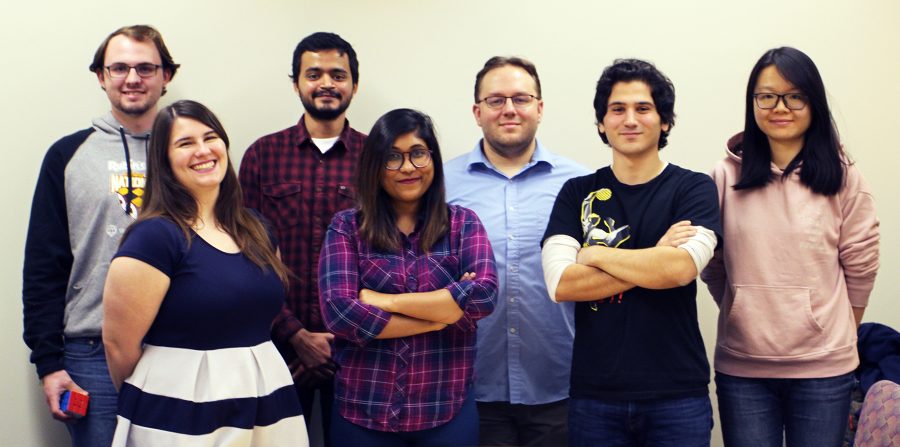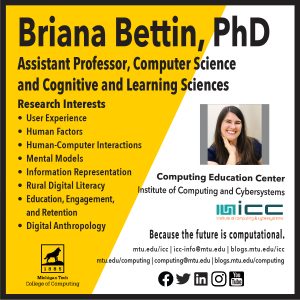
Michigan Tech 2020 Ph.D. graduate Briana Bettin, Computer Science, is among six new faculty members the College of Computing welcomed this fall. Bettin is an assistant professor for the Department of Computer Science and the Cognitive and Learning Sciences department.
This semester, she is teaching courses including CS1121 Introduction to Programming in C/C++, and pursuing research and other projects with faculty and students.
In this, Part II of this profile of Briana Bettin, Bettin and her faculty mentors talk research, education, and novel ideas.
Read the first installment of this article, ‘Briana Bettin, Asst. Prof., Part I: Neopets, HTML, Early Success Part I”, published Oct. 28, 2020, here.
Mental models, constructing knowledge, programming analogies.
Briana Bettin’s research interests are many. They include user experience, human factors, human-computer interactions, mental models, information representation, rural digital literacy, education, engagement, retention, and digital anthropology. Her Ph.D. dissertation aims to better understand how novice programmers approach learning programming, and how their construction of programming ideas might be better facilitated.
“I delve into mental models research and explore theories for how students might construct knowledge,” she explains. “Specifically, the major studies in my dissertation explore how prior applicable knowledge might allow for transfer to programming concepts, which can feel very novel to students who have never programmed before.”
Bettin is also exploring methods for designing programming analogies, testing their application in the classroom, and observing how their use may impact student understanding of specific topics. “I take a very user experience-oriented approach, and work to apply methods and ideas from user-experience research in the CS classroom space,” she says.
Creative energy, insight, and humanity.
With Computer Science department faculty members Associate Professor Charles Wallace and Assistant Professor Leo Ureel, Bettin has worked on projects studying how novice programmers communicate. She and Ureel also worked on several ideas in the introductory CS classrooms, including exploring pair programming obstacles in the classroom and in research.
“I got to know Dr. Wallace during my Ph.D., and I love getting his perspective on research ideas,” Bettin says. “He has so many interesting ideas, and he’s so fun to talk to!”
“Briana brings loads of creative energy, insight, and humanity to everything she does,” says Wallace. “We are very fortunate to have her with us.”
Passionate about Computing Education.

Other research collaborators include Lecturer Nathan Manser, Geological and Mining Engineering and Sciences, and Senior Lecturer Michelle Jarvie-Eggart, Engineering Fundamentals, College of Engineering, with whom Bettin has explored topics in technology acceptance across engineering and computer science.
“Briana has been an enthusiastic addition to our research group,” Jarvie-Eggart says, who is working with Steelman and Wallace on improving engineering students’ acceptance of programming. “She really is amazing!”
Jarvie-Eggart sat in on Bettin’s Intro to Programming class in fall 2019, and noted that Bettin’s. approach of teaching algorithmic thinking and logic—before students begin programming—helps make programming more accessible to all.
“It builds foundational knowledge from the ground up,” she says. “Our research team is very excited about using her progressive CS education approaches to teach engineers programming.”
“Stefka Hristova, in Michigan Tech Humanities, has always been supportive, helping me cultivate an interdisciplinary research vision and voice,” Bettin says. “Dr. Robert Pastel has also been so valuable in helping me approach my research with strong design. He has given me a lot of insight and I am so appreciative!”
“Briana is passionate about Computing Education, and she is invested in infusing equity and diversity into the STEM field,” Hristova says.
